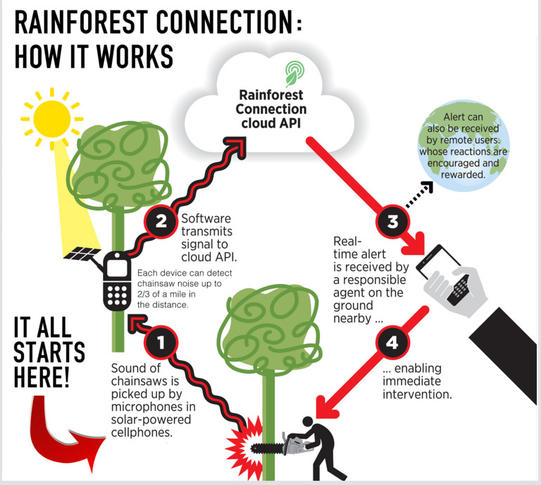August 11, 2014 – A Kickstarter campaign, for a project called the Rainforest Connection, has received $167,000 U.S. recently. Its goal – reduce illegal cutting of forests using old cell phones encased in solar panels and placed high in trees to listen and report on the sound of chainsaws. When detected the phones alert local forest rangers to catch those engaged in illegal logging.
The World Wildlife Fund estimates that 17% of greenhouse gas emissions (GHG) come from deforestation. And INTERPOL’s Project Leaf reports that 50-90% of global logging today is illegal.
The Amazon, Congo, Southeast Asia, and Central America house the rainforests of the planet, which occupy 7% of Earth’s continents. And boreal forests which are largely found in temperate regions of the planet are even larger, covering more than twice the area of rainforests and housing 30% of the carbon contained within life on this planet. So unregulated and illegal cutting represents a threat to all life on the planet.
Now consider this. In the U.S. alone each year, 150 million cell phones are thrown away. They end up in landfill where the chemicals and metals they contain leach into surrounding soil and aquifers.
So why not re-purpose these still usable phones rather than have them contribute to pollution. And why not use them in a cause to save the planet’s forests which are disappearing at a rate of 32,300 hectares (80,000 acres) each day.
Right now Rainforest Connection is testing old Android phones, some of them with five years of use on them. And you can help not just by sending money to fund the project’s activity, but also by sending them that old cell phone you are about to replace with the latest model.
Rainforest Connection has developed local partnerships with conservationists and community activists to help it establish its reporting network. It’s an intriguing organizational model which may catch on in addressing other planetary challenges.















[…] 50-90% of logging practices are illegal states Interpol. Deforestation contributes 17% to global GHG emissions. […]